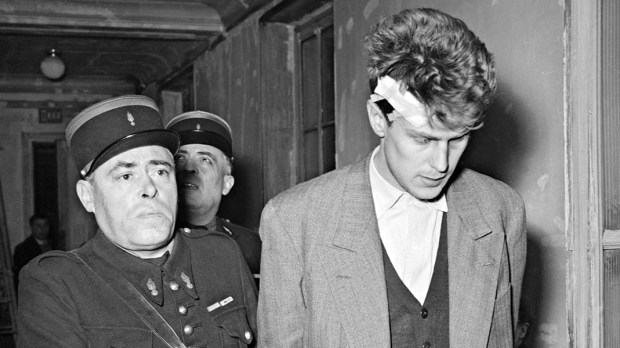It’s common, when trying to discredit a person with a complicated past, to say, “Well, he’s no saint,” as though anyone with a rap sheet is ineligible for canonization. The testimony of the saints indicates the opposite, though—any number of saints were terrible sinners and many were even convicted criminals. Their lives would have mattered whether or not they had ultimately attained holiness. But when we’re inclined to dismiss somebody as a lost cause or to deny him justice or dignity because of past crimes, we would do well to remember the saints who spent time in jail, asking their intercession that we would see not criminal records but beloved children of the Father worthy of life and respect.
Pope St. Callistus I (d. 222) was a young Christian slave who was given charge of the funds deposited in his master’s bank. Through mismanagement (and possibly embezzlement), Callistus lost this money, much of which belonged to Christian widows who were now destitute. Realizing the fate that awaited him, Callistus fled Rome but was pursued and captured by his master, who sent him to do hard labor. When Callistus tried to recover the lost funds by berating Jewish moneylenders who were at prayer, he started a fight in the synagogue and was arrested and sent to the salt mines. Amnesty was granted to Christian prisoners and Callistus returned to Rome, where his deep conversion ultimately led to his selection as the 16th pope, in which office he served for five years before he was martyred.
St. Mukasa Kiriwawanvu (~1863-1886) was a page working for the king of Buganda. He was a long-legged young man who was evidently rather sensitive about his height; when 15-year-old St. Gyaviira, another of the pages, teased him with the nickname “Long Legs,” Kiriwawanvu lost his temper and hit the smaller boy. A favorite of the king, Gyaviira tattled and got Kiriwawanvu thrown in prison for assault. There Kiriwawanvu stayed as the king became more and more suspicious of the Christians at court. When he put them all in prison, St. Charles Lwanga baptized the catechumens in his cell, but Kiriwawanvu was being held separately; he never received baptism of water, but was freed from his cell to receive the baptism of blood, killed alongside the young man who was the cause of his initial imprisonment.
St. Raphael Kalinowski (1835-1907) was a Polish engineer in the Russian army before becoming a traitor during the January Uprising. Kalinowski became minister of war for the Poles; this significant role meant that he would suffer much when the Polish cause was destroyed. Initially sentenced to death, Kalinowski was sent to Siberia instead, where he worked in the salt mines for 10 years, a prisoner not for his faith but for treason. But those 10 years of hard labor served as a sort of novitiate for the young man, who had been a lapsed Catholic until only a few years prior. After his release, Kalinowski became a Carmelite priest, in which role he served for 25 years.
Servant of God Jacques Fesch (1930-1957) was a wealthy French atheist who got his girlfriend pregnant, was made to marry her, then left her and their daughter for another woman, with whom he had a son. Finding neither joy nor peace in his life of dissipation, he decided to buy a boat and escape, but his father refused him the necessary funds. His mind made up, Fesch decided to rob a moneychanger; when he was pursued, he shot and killed a police officer. He was arrested and condemned to death, but during his three years on death row he went from ridiculing the Catholic faith to weeping over his sins, begging his wife to forgive him, and looking forward to his execution as the day he would meet Jesus. The diary he kept after his conversion shows a heart passionately in love with the Lord.
Servant of God Dorothy Day (1897-1980) is famous for her political activism and direct service to the poor. Her work was fueled by her relationship with Jesus, but her activism predated her conversion to Catholicism. As a young communist, Day was arrested during a demonstration seeking the vote for women. After her conversion, she was arrested multiple times for civil disobedience. While we look back on these arrests with respect, many of Day’s contemporaries considered her dangerous and defiant, a rabble-rouser and a closeted communist.
Bl. David Galvan Bermudez (1881-1915) entered seminary in Mexico at only 14, but a vocational crisis led him to leave the seminary and the pursuit of holiness. He fell into a dissipated way of life and was frequently drunk; on one such occasion, he was arrested for assault, having hit his girlfriend for dancing with another man. He later repented and returned to the seminary. After his ordination, Fr. Galvan chose to risk his life serving wounded Catholics during the Cristero War. He was caught and martyred.

Read more:
He was a drunk. And now he’s on the path to sainthood. Meet Matt Talbot

